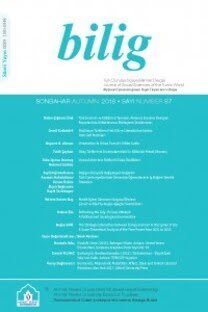Manevi Faktörlerin Üretime Etkisi
Makalenin ana fikrine göre, topluluktaki sosyal-psikolojik atmosfer ülkenin ekonomik-sosyal gelişmesinde başlıca etkendir.
Kazakistan’da pazarlama şartlarında insan üretici bir güç olarak algılanmakta ve onun kişisel istekleri dikkate alınmamaktadır. Bununla beraber, grup çalışmalarında her üyenin moral gücü bütün topluluğun üretici gücünün bir parçası sayılmaktadır.
Bu makalede soyal-psikolojik atmosfer, gelişimi ve üretime etkisi, ekonomik ölçünün anahtarları olarak geğerlendirilmiştir. Araştırma Cezkazgan şehrinde bulunan bakır eritme fabrikasında yapılmıştır. Araştırmanın başlıca amacı, basit çalışma grubundaki sosyal-psikolojik durum (psikolojik durum faktörleri, iş memnuniyeti, karşılıklık, çatışma, yönetici ve grup liderleri arasındaki rekabet, akıcılık, şahıslar arasındaki uyum, uzman notu vb.) ve üretime etkisini incelemektir. Ekonomik-matematiksel örneklemeye dayanarak, üretimin muhtemel en yüksek değeri, ideal sosyal-psikolojik durumda kaydedilmiştir. Üretimin, ek yatırımlar yapılmadan da, manevi faktörler sayesinde ortalama % 30’a kadar yükseltilebileceği tespit edilmiştir. Ekonomik ilişkilerin sosyal-psikolojik ilişkilerle bağlantılı olup bir bütün oluşturması gerektiği görülmüştür.
Anahtar Kelimeler:
Temel veya baş grup, grup çalışması, orta veya ikinci grup, üretici grup, basit üretici grup
The Role of Non-Material Factors in Increasing Labor Productivity
The main idea of article «The Role of Non-Material Factors in Increasing Labor Productivity » is that social –psychological climate in collective is the major factor of economic - social progress in the country. In Kazakhstani market conditions the understanding of the person as productive force has amplified and his personal features are ignored. However in conditions of teamwork moral qualities of each member of labor collective become a component of productive force of all collective. In this research paper the social - psychological climate, its development and influence on productivity are key objects of economic measurement. Research has been carried out in copper-smelting factory in the city of Dzhezkazgan. The main purpose of the research was to study a social psychological climate of a primary work collective (factors of a psychological climate, general job satisfaction, mutuality, neutrality, potential conflict, concurrence of the formal and informal leader in collective, intensity of potential fluidity, interpersonal compatibility, an evaluation of the master) and its influence on labor productivity. The greatest possible value of productivity has been designed at an ideal social - psychological climate on the basis of economic-mathematical model. It has been identified that on average it is possible to increase productivity up to 30 % due to the moral factors, not attracting additional investments. It is proved that economic relations should be bound with social – psychological ones, forming a single whole.
Keywords:
Basic or main production collective, collectivism, foreman evaluation factor intermediate or secondary collective, labor collective, primary labor collective, primary production collective, reciprocity factor,
- ISSN: 1301-0549
- Yayın Aralığı: Yılda 4 Sayı
- Başlangıç: 1996
- Yayıncı: Ahmet Yesevi Üniversitesi
Sayıdaki Diğer Makaleler
Tarihte ve Günümüzde Kazakistanın Alfabe Meselesi
Manevi Faktörlerin Üretime Etkisi
Sharzada AKHMETOVA, Ardak SAKHANOVA
Aydın-Karpuzlu Yöresinde Nişan Çiçeği Geleneği ve İşlevsel Yapısı
Ip ile Kurulan Zarf-Fiilli Parçaların Türkmen Türkçesinden Türkiye Türkçesine Aktarımı Üzerine
Türk Tiyatrosunda İki Kişilik Oyunlar Üzerine Bir Değerlendirme (1980-2000)
